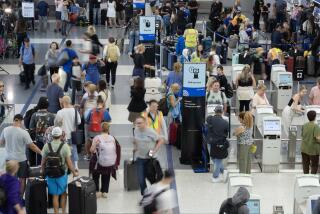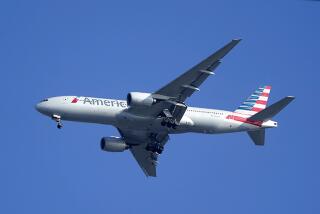3-hour limit placed on airline passengers’ tarmac waits
- Share via
Responding to horror stories of stranded passengers, federal regulators say they will begin levying hefty fines on airlines that leave travelers grounded in planes on the tarmac without food, water or the option to disembark.
The new regulations, announced Monday by U.S. Transportation Secretary Ray LaHood, require airlines to provide access to bathrooms as well as food and water on domestic flights within two hours of a delay. After three hours, passengers must be offered a chance to disembark.
Airlines that fail to comply could be fined up to $27,500 per passenger -- a potential penalty of $5.5 million for a jet with 200 people on board.
“Airline passengers have rights, and these new rules will require airlines to live up to their obligation to treat their customers fairly,” LaHood said.
The action, he said, was spurred by several notorious cases of flight delays, including the plight of passengers stranded for nearly six hours on a plane in Rochester, Minn., last summer.
The new regulations, which take effect in April, apply to domestic flights operated by U.S. airlines. Canada and the European Union have their own rules addressing delays.
The airline industry has opposed the rules, saying they will lead airlines to cancel flights to avoid fines -- creating further hardships for travelers. But passenger rights groups and pilots unions welcomed the agency’s aggressive stance.
“This is restoring civility and safety to air travel,” said Kate Hanni, a vocal supporter of the three-hour rule and founder of Flyersrights.org.
Hanni began her passenger rights crusade in 2006 after she and her family were stranded on the tarmac of Austin-Bergstrom International Airport in Texas for more than nine hours with overflowing toilets and no food or water.
At Bob Hope Airport in Burbank, attorney Maya Upton of Santa Barbara welcomed the change, saying she had been stuck on a delayed plane many times.
“I’ve definitely waited a couple hours and definitely would have liked food and water during that time,” she said.
Airlines should be required to do even more, Upton and others said, like turning on the air-conditioning system so passengers don’t sit for three hours in the stifling air of a grounded jet.
Jennifer Adams, who was waiting for a plane at Reagan National Airport near Washington, called for rules that are even stricter.
“Three hours is an excessive amount of time to sit on the runway,” said Adams, a frequent flier who was traveling to Portland, Ore., with her husband, Clancy. “I would say more like one hour.”
The airline industry criticized the restrictions, saying they could backfire.
“The requirement of having planes return to the gates within a three-hour window or face significant fines is inconsistent with our goal of completing as many flights as possible,” said James C. May, president of the Air Transport Assn. of America. “Lengthy tarmac delays benefit no one.”
The airline trade group has long argued that tarmac delays are due to varied circumstances that cannot be addressed by a federal mandate. For example, if a plane is delayed because of bad weather and a federal law forces the pilot to return to the terminal, the trade group argues that the plane can lose its spot in the departure lineup, putting the travelers even further behind schedule.
Lengthy delays are particularly prevalent at East Coast airports near Boston and New York, where flight schedules are tight and weather delays are common.
The increased oversight should not come as a surprise for the industry. The Transportation Department issued the first-ever fines for airline delays in November to Continental Airlines, ExpressJet Airlines and Mesaba Airlines for their roles in the Aug. 7 incident in Minnesota. In that case, a plane flown by ExpressJet for the Continental Express division of Continental Airlines was diverted to Rochester and passengers were forced to stay on the plane overnight, with nothing to eat but stale pretzels.
Continental Express doesn’t have gate privileges at the Minnesota airport, but Mesaba does. A Mesaba employee refused to allow passengers to disembark, incorrectly saying that they couldn’t come in because security screeners had gone home for the night.
The three carriers were fined a total of $175,000.
In another case last summer, a U.S. Airways flight from Philadelphia to West Palm Beach, Fla., was delayed on the tarmac for four hours and 21 minutes -- for a flight that was supposed to last two hours and 21 minutes.
A U.S. Airways flight from Boston to New York on July 31 was scheduled to last only 50 minutes. Instead, the flight was stranded on the tarmac for four hours and 15 minutes. U.S. Airways blamed both incidents on problems with the national aviation system.
Several airlines, including Continental, have already adopted company policies to return passengers to the terminal after long delays.
But airline officials say lengthy delays are still common because of unforeseen snafus and miscommunication.
From August to October alone, more than 60 domestic flights were delayed for more than three hours on airport tarmacs across the country, according to the Bureau of Transportation Statistics.
As part of the new rules, the Transportation Department will also bar airlines from scheduling chronically delayed flights, and will require carriers to assign staff to monitor problems with delays.
Sens. Barbara Boxer (D-Calif.) and Olympia J. Snowe (R-Maine), authors of a bill to protect passengers from tarmac delays, applauded the Transportation Department announcement but said they would continue to press for the legislation so that the new rule couldn’t be withdrawn by a future administration.
The Boxer-Snowe bill was introduced in 2007 but has failed to make much progress in Congress amid strong opposition by the nation’s airlines, which have contributed nearly $35 million to federal candidates since 1990, according to Opensecrets.org. When the bill was introduced, it was co-sponsored by an Illinois senator who now has great sway over the Transportation Department: Barack Obama.
Despite airline opposition, proponents of new rules to protect passengers from lengthy delays gained several major supporters in the last few months.
Soon after the Rochester, Minn., incident, the National Business Travel Assn., which represents more than 4,000 corporate travel managers and other travel professionals, announced that it had switched its position and now supported a rule to let passengers off a plane after a three-hour delay.
The Business Travel Coalition, which represents the travel departments of about 300 businesses worldwide, also switched sides after releasing the results of an online survey that showed 82% of travel professionals, business travelers and others support legislation to let passengers off a plane that sits on a tarmac for three hours or more.
Pilots also voiced support for the new regulations.
“Pilots don’t like the idea of keeping passengers in the conditions that the airlines are imposing,” said Jason Goldberg, a 12-year veteran pilot for American Airlines and a representative for the Allied Pilots Assn.
Goldberg complained that airlines have been trying to save money by scheduling more flights close together without paying for extra staff, terminal gates and backup crews to respond when problems cause delays.
Justin Nave, a businessman who was waiting at Bob Hope Airport for a delayed flight to his home in Connecticut, said he hoped the new mandates would force air carriers to make improvements.
“Hopefully this will get the airlines to run more efficiently,” he said.
Staff writer Nathan Olivarez-Giles contributed to this report.
More to Read
Inside the business of entertainment
The Wide Shot brings you news, analysis and insights on everything from streaming wars to production — and what it all means for the future.
You may occasionally receive promotional content from the Los Angeles Times.










